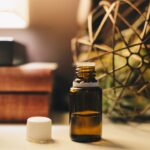When it comes to skincare, many people are turning to natural and organic products to achieve a healthy and glowing complexion. One popular option is the use of essential oils. Essential oils are highly concentrated plant extracts that have been used for centuries for their various therapeutic properties. They are derived from different parts of plants, such as flowers, leaves, stems, and roots, and are known for their potent fragrance and healing properties.
Using essential oils in your skincare routine can provide numerous benefits for your skin. These oils are packed with vitamins, antioxidants, and other beneficial compounds that can nourish and protect your skin. They can help to moisturize, soothe inflammation, fight acne-causing bacteria, reduce the appearance of fine lines and wrinkles, and even out your skin tone. By incorporating essential oils into your skincare routine, you can achieve a healthier complexion without the use of harsh chemicals or synthetic ingredients.
Understanding Essential Oils and Their Properties
Essential oils are extracted from plants through various methods such as steam distillation, cold pressing, or solvent extraction. The extraction process ensures that the beneficial compounds present in the plant material are concentrated in the resulting oil. Each essential oil has its own unique set of properties that make it suitable for different skincare concerns.
Some essential oils have antibacterial properties that can help to fight acne-causing bacteria and prevent breakouts. Others have anti-inflammatory properties that can soothe redness and irritation. Some essential oils are known for their moisturizing and hydrating effects on the skin, while others have anti-aging properties that can help to reduce the appearance of fine lines and wrinkles.
It is important to note that essential oils are highly concentrated and should be used with caution. They should always be diluted with a carrier oil before applying them to the skin to avoid any adverse reactions. It is also recommended to do a patch test before using any essential oil to check for any potential allergies or sensitivities.
Lavender Oil: The Soothing and Calming Oil for Your Skin
Lavender oil is one of the most popular essential oils used in skincare. It is known for its soothing and calming properties, making it an excellent choice for those with sensitive or irritated skin. Lavender oil has anti-inflammatory properties that can help to reduce redness and irritation, making it beneficial for conditions such as acne, eczema, and psoriasis.
In addition to its calming effects, lavender oil also has antibacterial properties that can help to fight acne-causing bacteria and prevent breakouts. It can also help to regulate sebum production, making it suitable for oily and acne-prone skin. To incorporate lavender oil into your skincare routine, you can add a few drops to your moisturizer or mix it with a carrier oil and apply it directly to your skin.
Tea Tree Oil: The Acne-Fighting Essential Oil
Tea tree oil is another popular essential oil that is widely used for its acne-fighting properties. It has powerful antibacterial properties that can help to kill acne-causing bacteria and prevent breakouts. Tea tree oil also has anti-inflammatory properties that can reduce redness and inflammation associated with acne.
To use tea tree oil for acne-prone skin, you can mix a few drops with a carrier oil and apply it directly to the affected areas. You can also add a few drops to your cleanser or toner to enhance their acne-fighting properties. However, it is important to note that tea tree oil can be drying, so it is recommended to use it sparingly and moisturize your skin afterwards.
Rosehip Oil: The Anti-Aging Oil for a Youthful Glow
Rosehip oil is a highly nourishing and hydrating oil that is known for its anti-aging properties. It is rich in vitamins A, C, and E, as well as essential fatty acids, which can help to improve the texture and tone of your skin. Rosehip oil can help to reduce the appearance of fine lines and wrinkles, fade scars and hyperpigmentation, and promote a youthful glow.
To incorporate rosehip oil into your skincare routine, you can apply a few drops to your face and neck after cleansing and toning. You can also mix it with your moisturizer or use it as a spot treatment for scars and hyperpigmentation. Rosehip oil is suitable for all skin types, including sensitive skin.
Frankincense Oil: The Oil for Rejuvenating and Restoring Your Skin
Frankincense oil is a powerful essential oil that is known for its rejuvenating and restoring properties. It has been used for centuries in traditional medicine for its ability to heal wounds, reduce scarring, and even out skin tone. Frankincense oil can help to stimulate the production of collagen, which can improve the elasticity and firmness of your skin.
To use frankincense oil in your skincare routine, you can mix a few drops with a carrier oil and apply it to your face and neck. You can also add it to your moisturizer or use it as a spot treatment for scars and uneven skin tone. Frankincense oil is suitable for all skin types.
Geranium Oil: The Oil for Balancing Your Skin’s Natural Oils
Geranium oil is a versatile essential oil that is known for its balancing properties. It can help to regulate sebum production, making it beneficial for oily and acne-prone skin. Geranium oil also has antibacterial properties that can help to fight acne-causing bacteria and prevent breakouts.
To incorporate geranium oil into your skincare routine, you can mix a few drops with a carrier oil and apply it to your face and neck. You can also add it to your moisturizer or use it as a spot treatment for acne. Geranium oil is suitable for all skin types.
Chamomile Oil: The Oil for Soothing Irritated and Sensitive Skin
Chamomile oil is a gentle and soothing essential oil that is known for its calming properties. It can help to reduce redness and irritation, making it beneficial for sensitive and irritated skin. Chamomile oil also has anti-inflammatory properties that can soothe inflamed skin and promote healing.
To use chamomile oil for sensitive skin, you can mix a few drops with a carrier oil and apply it to your face and neck. You can also add it to your moisturizer or use it as a spot treatment for redness and irritation. Chamomile oil is suitable for all skin types.
Carrot Seed Oil: The Oil for Brightening and Evening Out Your Skin Tone
Carrot seed oil is a powerful essential oil that is known for its brightening properties. It is rich in antioxidants, vitamins, and minerals that can help to improve the overall appearance of your skin. Carrot seed oil can help to reduce the appearance of hyperpigmentation, fade scars, and even out your skin tone.
To incorporate carrot seed oil into your skincare routine, you can mix a few drops with a carrier oil and apply it to your face and neck. You can also add it to your moisturizer or use it as a spot treatment for hyperpigmentation. Carrot seed oil is suitable for all skin types.
Ylang-Ylang Oil: The Oil for Hydrating and Moisturizing Your Skin
Ylang-ylang oil is a highly moisturizing essential oil that is known for its hydrating properties. It can help to nourish and moisturize dry and flaky skin, leaving it soft and supple. Ylang-ylang oil also has a calming and soothing effect on the skin, making it beneficial for sensitive and irritated skin.
To use ylang-ylang oil for hydration, you can mix a few drops with a carrier oil and apply it to your face and neck. You can also add it to your moisturizer or use it as a spot treatment for dry patches. Ylang-ylang oil is suitable for all skin types.
Incorporating Essential Oils into Your Skincare Routine for a Healthy and Glowing Complexion
Incorporating essential oils into your skincare routine can provide numerous benefits for your skin. From soothing and calming properties to acne-fighting and anti-aging effects, essential oils can help to improve the overall health and appearance of your skin. However, it is important to remember that essential oils are highly concentrated and should be used with caution.
Before using any essential oil on your skin, it is recommended to do a patch test to check for any potential allergies or sensitivities. It is also important to consult with a dermatologist or skincare professional before incorporating essential oils into your routine, especially if you have any pre-existing skin conditions or are using other skincare products or medications.
When using essential oils, always dilute them with a carrier oil before applying them to your skin. This will help to prevent any adverse reactions or irritation. Start by using a small amount of essential oil and gradually increase the concentration as needed.
In conclusion, essential oils can be a valuable addition to your skincare routine. They offer a natural and organic alternative to conventional skincare products, providing numerous benefits for your skin. By understanding the properties of different essential oils and how they can benefit your skin, you can create a personalized skincare routine that promotes a healthy and glowing complexion.



